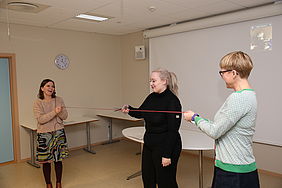BUPA has developed a video conferencing based service for children and adolescents who need to talk to a therapist. The patient does not have to make long journeys to talk to a therapist anylonger. They can easily carry out treatment wherever they are, and also avoid being absent from school.
No more long journeys
‐ In some cases, treatment will take place only over Skype and video conferencing, while it will usually be combined with a face‐to‐face treatment. All services are developed in close cooperation with the children's families, primary health services, healthcare professionals, schools, child welfare and other clinics, explains Erlend Bønes, Project manager for eCAP Norway at the university hospital. For each patient, the service is adapted to meet the needs of the patient, relatives, as well as local therapists and other professionals.
‐ The goal is to make it easier and faster for patients to get in touch. Long journey can in worst case make a initially vulnerable patient even sicker, says Elin Breivik, who is the project leader of eCAP at the Norwegian Centre for E‐health Research.
Available technology
Elin Breivik explains how video conferencing in the conference room, for security reasons, for a long time was the only opportunity for communicating with patients. On the other side, the patient had to go to a video conferencing studio in his municipality where the equipment could be of different types and quality, often resulting in connection problems, delayed sound and image ‐ and various other challenges.
The breakthrough came this spring. Skype for Business was approved for health communication in the health region. Thus, the therapists can talk to the patients wherever they are. All that is needed is a computer with webcam and a room where the patient is sure that no unauthorized person can hear or see the conversation. And the therapist does not have to make any more effort than closing the office door. The BUPA administrators have installed Skype for business at their workstations. The technical threshold has been completely removed.
For further information, please contact: Erlend Bønes, Project manager, erlend.bones{at}unn.no
